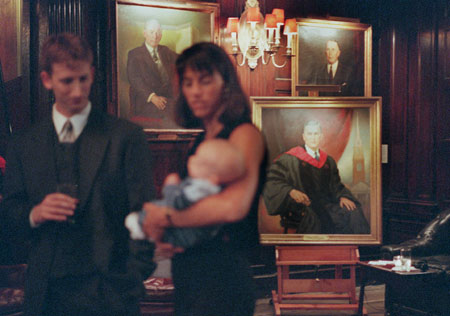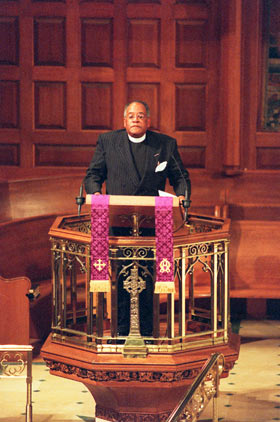Service recalls ‘a loving, kind’ man

A chill, persistent rain spattered the puddled streets as a crowd of somberly dressed folks under glistening umbrellas slowly made their way into the Presbyterian church at Madison Avenue and 73rd Street in New York City.
The occasion was a memorial service for Nathan Marsh Pusey, 24th president of Harvard, who died Nov. 14 at the age of 94. At 3 p.m., Saturday, Dec. 8, the light was already failing, and the church, with its warm wood paneling lit by hanging lamps, seemed a welcome refuge from the wet weather and the gathering darkness outdoors.
Comforting as it was, however, the church was not the one that the Puseys regularly attended. That church is St. James Episcopal at Madison Avenue and 71st Street. The service was moved two blocks uptown because St. James was undergoing repairs.

David Rockefeller ’36 and the Rev. Professor Peter J. Gomes, the Plummer Professor of Christian Morals and Pusey Minister in the Memorial Church, both offered personal reflections on Pusey’s life.
Rockefeller, who became Pusey’s friend soon after being elected to the Board of Overseers in 1954, said that while there were many commendable aspects of Pusey’s life and career, two stood out for him. Rockefeller praised him for being “a staunch defender of academic freedom at a time when it was being challenged” (during the Senate investigations of the early 1950s under Joseph McCarthy) and for raising record amounts of money for the University.
“But most of all,” he said, “I am here to remember him as a wonderful human being who believed in moral principles and who stood up for them. More than anything else, I like to think of him as a loving, kind, understanding person who was a friend as well as a great educator.”
Gomes, alluding to Pusey’s training as a classicist, began his remarks with a quotation from Aristotle.
“Aristotle said, ‘If you would understand virtue, observe the conduct of a virtuous man.’ Well, we have had the opportunity to observe the conduct of a virtuous man.”
Briefly recounting the highlights of Pusey’s life, Gomes painted a picture of a modest, hardworking teacher with a talent for recognizing and nurturing talent in others.
Hailing from Council Bluffs, Iowa, Pusey was the first Harvard president to come from west of the Hudson River.
“As a Harvard undergraduate he had sat at the feet of the great scholars of the day, and he always said that if it could happen to a young boy from Council Bluffs, Iowa, it could happen to anyone … and it should,” Gomes said.
He added that one of Pusey’s great gifts was to recognize and reward talent early in the career of young scholars, “and to encourage them as he himself had been encouraged.”
Pusey built more than any other president of Harvard, Gomes remarked, both in a bricks and mortar sense and in terms of community.
“He might very well be called the transformer of modern Harvard.”
Referring to the two great adversarial confrontations of Pusey’s presidential career, with McCarthy at the start of his presidency and with student radicals at its close, Gomes said “adversity brought out in him not bitterness but strength and serenity.”
That strength and serenity came from three sources, Gomes said.
“First, he was always able to see the whole and not be intimidated by the parts. He did not get upset when the parts seemed to go out of whack. Even during the troubles of the ’60s, he would say that he had been fortunate to be in education at a most interesting time.”
Pusey’s second source of strength came from his marriage to his wife, Anne. The two had always worked together as a team, Gomes said. “She was his strength and together they were a tower of strength and good for all of us.”
Finally, his strength came from “his indomitable belief in God. He was not ashamed to be known as a Christian, and he gave the lie to those who said it was impossible to be a Christian man and a thinking man.”
Gomes noted that the two structures on the Harvard campus which bore Pusey’s name – the Pusey Library and the Pusey Room in Memorial Church – express the two sides of Pusey’s character: “The library, the temple of wisdom, and the church, the temple of the living God.”
Gomes ended by comparing Pusey with a character in John Bunyan’s Christian allegory, “Pilgrim’s Progress,” a character known as Mr. Valiant-for-Truth, who “descends into a watery grave to meet his maker, ‘And all the trumpets sounded for him on the other side.’ And so do they for Nathan,” Gomes declared.




